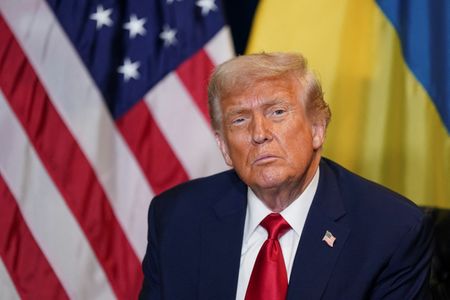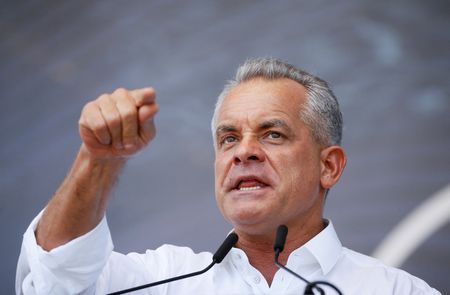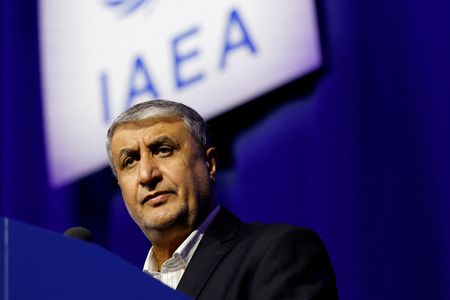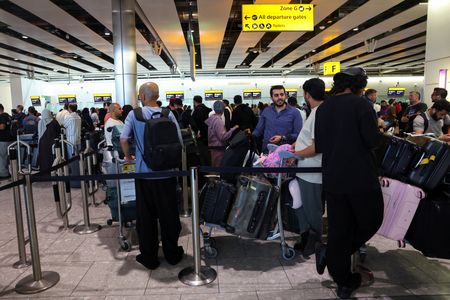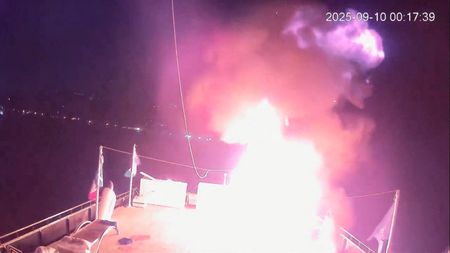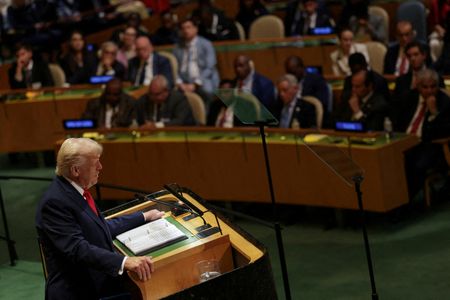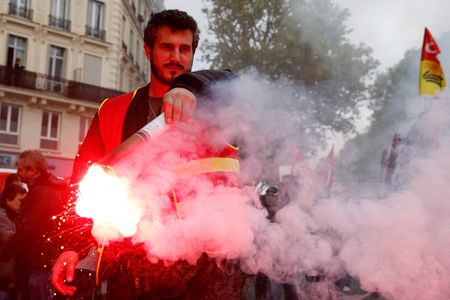By Elizabeth Piper, Ludwig Burger and Lili Bayer
LONDON/BERLIN/BRUSSELS (Reuters) -Donald Trump’s comments backing Kyiv to regain all of its territory from Russia have sparked a mixture of relief and suspicion that the U.S. president is ready to leave Europe more to its own devices in supporting Ukraine.
Trump’s remarks on Truth Social marked an abrupt and major rhetorical shift for the U.S. leader who had previously nudged Ukraine to give up territory to end the war and rolled out the red carpet for Vladimir Putin in Alaska only last month.
But it was not immediately clear whether he would back up his words with a shift in U.S. policy, an ambiguity that could keep the onus on Europe to meet more of Ukraine’s needs through weapons and financing as Washington’s role recedes.
“I think people are taking heart because it does suggest… that his understanding of the conflict has shifted,” Neil Melvin, Director, International Security at RUSI, told Reuters about Trump’s comments.
“He has acknowledged that the conflict is more complicated and he’s clearly frustrated with Putin, so that I think it is perhaps a success for Ukrainian and European diplomacy that that explanation has got through.”
However, Trump is maintaining a strategic ambiguity around the conflict, encouraging Ukraine without committing U.S. support, Melvin said.
“So the narrative around what he is saying has shifted but he still seems to be making it about distancing the U.S. from leading on the conflict. He’s putting it back onto Europe all the time.”
STEPPING UP WILL NOT BE EASY FOR EUROPE
Germany’s Foreign Minister Johann Wadephul welcomed Trump’s comments but said it was time for Europe to step up.
“We have to become more sovereign,” Wadephul told Germany’s Deutschlandfunk radio.
“We can achieve much more; not all European states have delivered what they promised Ukraine. We have to look at what other financial and military options we have,” he said, adding it would not be easy for Europe to beef up its security efforts.
Two officials, speaking to Reuters on condition of anonymity, also cautioned that Trump may be signalling that it was up to Europe to help Ukraine now.
“He seems to be saying his goodbyes, no? But that can change tomorrow. In any case: the cards are clear for us. We know what we should be doing,” a Western European official said.
A senior Eastern European diplomat said Trump’s Ukraine comments aimed to show “that he is starting to disengage by sending a message that it is Europe’s question”.
European defence stocks rose in morning trade on Wednesday after Trump’s comments but Ukraine’s international bonds fell.
“Donald Trump’s comments on the Ukraine war are contradictory,” said Josef Janning, senior associate fellow at the German Council on Foreign Relations.
“In my view, this is just talk. As I see it, ever since the meeting in Alaska, Trump is walking away from his engagement and ending this war,” Janning said.
EUROPE ALREADY TAKING ON A GREATER ROLE
Before his return to the White House in January, Trump had boasted of being able to end the Ukraine war in 24 hours if re-elected. Following a disastrous meeting with Ukrainian President Volodymyr Zelenskiy at the Oval Office in February, European leaders have made concerted efforts to bring Trump onside.
They have also sought to convince him that Moscow bears sole responsibility for the war, which began with Russia’s full-scale invasion of Ukraine on Feb. 24, 2022.
The U.S. has long been Ukraine’s biggest single backer and weapons supplier but since taking office Trump has insisted Europe take on a much greater share of its own defence burden. To some extent, that is already happened.
European members of the NATO alliance have raised their military spending and also supplied Ukraine with air defences under a new system to give Kyiv weapons from U.S. stocks using funds from NATO countries.
Despite European efforts, Melvin said, Trump’s rhetoric could shift again.
“I think we are always just one call to Putin away from a shift and that’s why I think fundamentally the first eight months have eroded trust in Europe in the Trump administration’s approach and this doesn’t restore trust.”
(Reporting by Elizabeth Piper, Ludwig Burger, Lili Bayer, Alexander Ratz; writing by Matthias Williams; Editing by Ros Russell and Gareth Jones)

